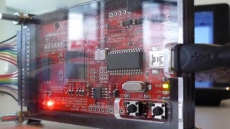A 'flypad' touchscreen technology similar to what is seen in i-pads has provided crucial insights into how our brain decides what and how much to eat.
The findings revealed surprising similarities between the way mammals and flies eat.
"What and how we eat is a crucial determinant of health and wellbeing. In lab experiments, we found that each time the fly touched the food, we were able to detect it, allowing us to follow the details of feeding in high resolution and real time," said Carlos Ribeiro from the Champalimaud Neuroscience Programme in Portugal.
They found that flies ate by rhythmically extending their proboscis (eating organ) in a highly stereotyped fashion.
When they are hungry they do not change the rhythm of feeding but instead alter how long they wait to take the next bite.
"This means that flies change different aspects of their behaviour depending on how hungry they are. Furthermore, the way flies adapt to starvation is similar to how mammals do it," Ribeiro added.
To complement the 'flypad' technology, researchers also developed another method that allows them to detect when the food reaches the nervous system.
They took a protein from the firefly, the one that makes the firefly shine at night, and expressed it in the brain of the fruit flies.
"We then fed them with a substance that activates that protein. This way, we could make sure that the amount and the timing of flashes from the brain are related to food intake and nutrient absorption," said Pavel Itskov, from the behaviour and metabolism lab at Champalimaud Neuroscience Programme.
The results were striking.
"It showed us that the food reaches the nervous system extremely fast, in as little as 20 seconds," Itskov noted.
The paper appeared in the scientific journal Nature Communications.





